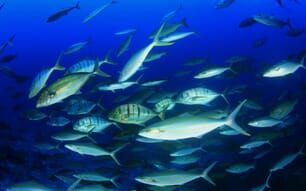The Action Plan to restore the Baltic Sea environment was agreed on by the region’s Environment Ministers in 2007. This week’s gathering was the last preparatory meeting before the Ministerial Meeting in Copenhagen on 3 October, when a Ministerial Declaration will be signed to mark the end of the review. It is clear from these final meetings, that there is a lack of commitment from Member States, some of which are hesitating to use strong and clear language stating the urgent need for action.
“We have the potential to make the Baltic Sea a model for marine management through the full implementation of the 2007 Action Plan. But now that the time has come to start realising the plan, it is frustrating to see how the countries are backing away from agreed actions,” stated Hanna Paulomäki, Oceana’s Baltic Sea project manager.
On the issue of biodiversity, the organisations are worried about some countries’ hesitation to implement the agreed network of Marine Protecting Areas (MPAs) in accordance with a timetable, and that other contracting parties are failing to take action to restore fish stocks. Some of the language used now is less ambitious than the recently agreed basic regulation of the EU Common Fisheries Policy (CFP).
Commercial interests are also hindering the publication of a Baltic-wide assessment on the threat status of species and habitats – a “red list”. Based on the widely accepted and commonly used criteria of the International Union for the Conservation of Nature (IUCN), Baltic cod is classified as “vulnerable”. However, Denmark and Germany are reluctant to include the species in the red list assessment as the species is commercially exploited.
Under pressure from other countries and NGOs, Sweden has now revised its position on eutrophication, to more effectively control over-fertilisation and excess agricultural nutrient runoff, the main cause of the yearly algae blooms in the Baltic Sea.
“Under pressure from Denmark, Finland, Germany and NGO observers, Sweden has significantly changed its position from the last meeting and now accepts nutrient bookkeeping on farmland as well as nutrient surplus calculations by 2018. This is a first step in the right direction, but much work still needs to be done,” added Gunnar Norén, Executive Secretary of Coalition Clean Baltic.
The review of the HELCOM BSAP and the new Ministerial Declaration is supposed to address the continuing environmental challenges of the Baltic Sea in order to reach good environmental status by 2021, but despite the ambitious agreement in 2007, which includes clear targets and deadlines, wavering commitments and the hesitation of different delegations are halting progress.
To restore the health of the sea, Baltic Sea governments need to deliver on their environmental promises. CCB, FISH and Oceana want to see governments take action to:
· Restore water quality through a significant reduction of the amount of agricultural nutrient run-off; the main cause of eutrophication in the Baltic Sea.
· Recover the natural wealth of fish stocks in the Baltic Sea to ensure long-term sustainability and ecosystem integrity.
· Revive the biological diversity by protecting important areas from destructive practices and putting in place proper management plans and measures.
The next and final round of discussions, ahead of the Ministerial Meeting, will take place on 2 October.
Learn more: www.raceforthebaltic.org


